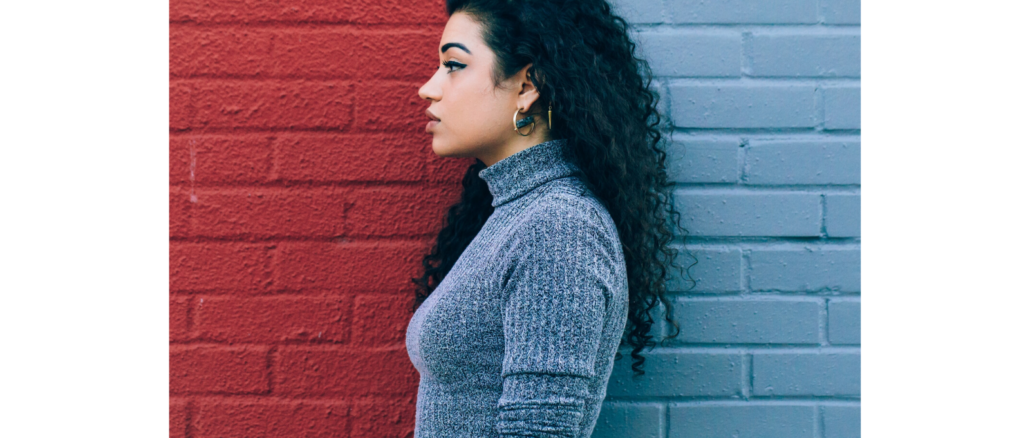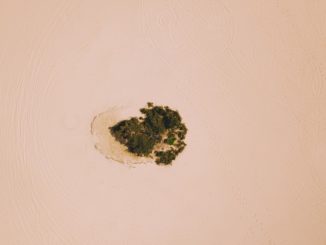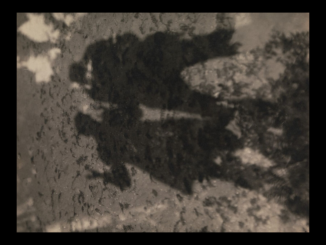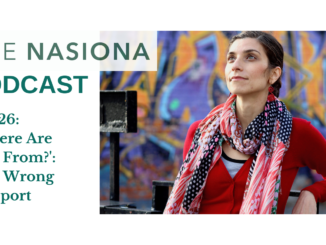
Previously published in Kartika Review 17 (2017).
My mother always asserted that Japanese persimmons were hard to the bite, not soft. There are, actually, two common Japanese persimmons—the firm Fuyu my mother loved and the softer, juicier Hachiya, which she apparently disdained and therefore did not consider Japanese at all. The Hachiya is bitter if consumed when firm and only sweetens as the sun softens its flesh. The Fuyu is sweet and mild while hard.
Perhaps my mother rejected the Hachiya as Japanese because her experience of Japan had been far from soft or easy. Growing up poor before the war came crashing through her world like an earthquake, typhoon, and tsunami all at once, her life had always been hard. As a child I was told stories of my mother working as a young nurse while picking lice off other nurses’ heads in the dormitory at night, of having her family’s three successive homes burned down during wartime air raids, of a younger sibling sent away to safety far away in the country not to be seen again until years later when the war had ended, of a brother who went to battle and never returned. It is no wonder that of nine original siblings, three of them escaped into post-war marriages with Americans despite the fact that racism against the Japanese was still strong here.
Though I don’t look exactly Japanese—I don’t look particularly close to any ethnicity exactly—I think when I was younger, men who either learned of my background or somehow discerned it (Asianophile white men are notoriously adept at noticing Asian features in whatever form they pop up) still found me exotic. I recall in college, when taking Japanese language or Asian literature classes, I would always gravitate toward sitting near the other Asians and as far away from the white men as possible to avoid targeting and exoticization. Even those men who weren’t out and out Asianophiles seemed to find my Japanese origins novel and interesting, so I shouldn’t have been surprised when among the first things my college boyfriend shared with his family about me was that I was half Japanese.
![]()
“I have something to show you,” my boyfriend’s father said to me upon meeting me. He almost hopped to the other room and into a closet with a kind of excited glee. He carefully pulled out a box, and from within the box withdrew a Japanese flag hand-signed in Japanese with messages and names, none of which I could read. Despite many years of Japanese language school on Saturdays as a child and several years of college Japanese, I never have been very good at picking up the language or retaining it. His facial expression as he presented it to me was both eager and pleased. The flag, he said, was taken off the body of a dead soldier—a war trophy, I suppose. He smiled at me. Did he think he was sharing a cultural artifact that I would connect with and appreciate? I smiled nervously back. I don’t recall what I said. I wanted show and tell to end.
Everything in his expression and body language told me that he had no idea this artifact might be upsetting or offensive. Never mind that my mother had barely survived that war herself, and her brother could well have been the body such a flag was removed from.
I don’t recall noticing how my boyfriend reacted. All I could focus on was the death shroud being presented to me. I’d like to think that his father only had the best intentions in mind in sharing this with me. Like my own father, also a veteran of the Second World War, my boyfriend’s dad was probably just another old man who wanted to tell stories about the things he’d seen and experienced to someone who would listen and care. My own father, however, never spoke of death or battles. He was in the Navy, so maybe he never saw direct combat. But he had a Japanese wife who he knew had suffered, so brief mentions of his time in the military were largely supplanted by tales of growing up poor on a farm in Northern Louisiana.
My boyfriend’s father’s nickname was “Whitey.” His father’s nickname had been “Red.” For reasons astonishingly unrelated, my ne’er do well boyfriend was dubbed by his friends, “Blue.” Red, Whitey, and Blue. Like the flag I grew up honoring every day in elementary school, pledging my allegiance to, a ritual both normal and alienating, hiding troubling histories under one nation, under God.
![]()
A few years later after college when I met Terry, there was a surprising sense of relief… of recognition. Terry was the first person I’d dated who was half Japanese, too. I found comfort in the odd sense of familiarity I felt with someone I barely knew. Terry was half Mexican and half Japanese, while I was half Japanese and half white. Southern white, I generally qualified, because culturally it seemed more accurate than the Irish my father always claimed as his heritage.
My father was a Southern farm boy at heart. I knew on some level that as a white Southerner born in 1918, he likely had a solid foundation of racist ideologies implanted in his subconscious. I had certainly heard blatant racist statements from his siblings while visiting his family in Louisiana. But if he acted on or spoke those racist worldviews, I have long since blocked them out of my memory because I want to remember him as the poor but optimistic farm boy who picked cotton and blackberries before walking to school each morning.
In California, he didn’t have the space to farm, but he took advantage of every possible spot to do so, planting tomatoes that entwined themselves in my mother’s carefully trimmed Japanese topiaries. Despite growing up in poverty with more siblings than I can remember the exact names of, Dad was soft where mom was hard. The tomatoes he grew were juicy and full of flavor. But what I remember more than the tomatoes was how, when thick green hornworms would appear, large and fleshy, Dad would just grab them off the plants and throw them on the driveway where they would spatter their green blood across the concrete. Dad, too, had grown up poor. He, too, had seen the war. Perhaps on some level he knew that the world didn’t tolerate softness.
Terry was both more Japanese than I was and less; I was not at all Mexican but wished I was. Terry, you see, was at least third or fourth generation Japanese American on his father’s side, so he didn’t experience the daily onslaught of Japanese language, rigid control, and dried squid snacks I had been accustomed to growing up in my immigrant mother’s household. He didn’t have a history of hiding rice crackers in his locker at school so he wouldn’t seem different. Instead, he gravitated toward Japanese culture in the same way that I sometimes recoiled from it. He took trips to Japan, joined an Asian American fraternity in college, and volunteered for Asian American organizations. At the time I met him, most of his friends were J.A.
![]()
Decades later, Terry, now 50, is learning the esoteric art of fermenting Japanese pickled vegetables and no doubt tormenting his lovely Jewish wife with them—or charming her with his arcane exoticism. While I was busy internalizing a resistance to Japanese culture because it represented all my difficult interactions with my mother (or perhaps more simply, I was internalizing self-hatred because of all the ways being Japanese made me different), Terry was embracing a Japanese culture that was just out of reach and internalizing similar resistance to his Mexican side. He said to me via text not long ago,
“I’m not as close to that side of the family and don’t really feel as familiar with Mexican culture as I do with the Asian community. Don’t get me wrong, I am so proud of that side, but as far as identity, it’s hard. I think Mexicans need to prepare for the future. It seems like it isn’t a priority in that community. They would rather their kids go into the military than to college. They have high rates of diabetes because they are eating horribly. Poverty is high because religion is more important than education.”
I, on the other hand, without a drop of Latinx blood in me, had always been almost overly fond of Latinx cultures. I’d grown up in Carson, California, which had a large Latinx population. My closest cousins, whom I often spent weekends with, grew up in heavily Latinx East L.A. And looking the way I did, with masses of dark brown hair, brown eyes, and skin that was neither white nor brown, I blended in nicely, thank you very much.
I did not want to stand out.
The families of my Latinx friends were welcoming where my mother was often distant, and so I gravitated toward their homes. And, having grown up in a working class household where fatty surplus government cheese and butter were considered a treat, I knew long before I’d taken a single ethnic studies class that you couldn’t simply lay the blame for the impoverished state of an entire community on poor eating “choices” or on the influence of religion without first examining the impacts of class, not to mention rooting around in centuries of colonialism and marginalization.
But despite Terry’s being both more and less Japanese than I was, and despite my being at least more appreciative of Mexican culture and values than he was, there was something undeniable we shared. We were both hapa, or hafu: half. Neither of us really fit in either world. But we fit with each other.
Being young, we fought. Incessantly. We found each other at a juncture in our lives when we were in transition. His mother was dying slowly from a debilitating, degenerative neurological condition. My father was dying from cancer and complications from stroke. We had both graduated college but were at loose ends. With no solid career prospects in sight, the morass of illness and death pervading our lives seemed to stop us from making any strides forward. We both accused each other of being lazy. We criticized what we most feared in ourselves.
![]()
Every five or ten years, Terry and I find each other.
“Just the other week I was planting raspberries, blueberries, and a persimmon tree in our back yard,” he told me, “The raspberries and blueberries were for my kids, but the persimmon tree was for me. And I had this distinct flashback to your mother in your family’s back yard with her persimmon trees.” She had two of them, both fruiting abundantly each year, a testament to my father’s farming skill and perhaps also to her deep longing for a Japan that, while filled with difficult and painful memories, she feared growing further from with each decade that passed.
“I dared mention your name out loud,” Terry continued, “when no one could hear me. The very next week I saw you had viewed my LinkedIn profile.” He claims that all he has to do is say my name aloud or stir up some almost forgotten memory, and no matter the distance, I will respond.
Emails turned into long, rambling text messages shot rapid fire across the distance from Santa Monica to Denver.
Terry: Still lusting over Peter Dinklage? Man, you were about 8 years ahead of the curve there. he’s considered very hot now.
Me: Yes. I have a Peter Dinklage action figure on my desk. Liking fatherhood? How old are they? You know there’s a term now for 1/4 Asian babies: Quapa.
Terry: I just call them Jew-panese. I’m one of 5 mixed Jew-panese couples, although I’m the only Japanese man….
We are older now but the memories—not as events but as energy and quick rapport—always come flooding back. The memories are sweet like Fuyu persimmons, but hard and firm and resilient like them too.
“I honestly believe your brain does some cleaning,” Terry told me. “After I got married, I couldn’t remember the names of most of my exes. It’s an odd thing. I see their faces as if through tracing paper. Faint images, but no detail. You, on the other hand, are burned into my memory.”
Unlike other persimmons that fall apart in your hand and trickle juice down your chin, the reality of our lives, too, now allows for the sweetness of the Fuyu, but like it, also remains firm—steadfast and very nearly unyielding. The seemingly limitless possibilities of youth are limited by the structure and commitments that come with age. For my mother, I don’t know that there ever was a day in her life where the light shone softly on a world of endless possibilities. Her life was always hard. She found sweetness in her love for her children, but she generally could not bring herself to be soft with us. Her distance, her discipline, her expectations, even her love for us always had hard edges.
![]()
“I think everyone should be the love of someone’s life,” Terry told me once, as if to comfort me. “You made me explore things beyond my usual curiosity. Being with you was always exhilarating to my creativity and my enjoyment of just the fact I was healthy and alive. You are the love I compare all my loves to. You are more hapa than I am. I never felt the need to explain anything to you.”
It is now approximately 25 years after our ill-fated romance ended. Our fears about each other and ourselves were largely unfounded. Neither Terry nor I could be considered lazy. He’s a successful animator in Hollywood; I’m a professor in Colorado. We married different people. Twice.
I was married first to a man I didn’t love, to Blue, whose father carried that flag home from Japan and carefully preserved it for decades without an inkling of what it meant. I married Blue so that I could qualify for more financial aid. We drove to Las Vegas and simply signed forms in a government office. When they handed us our marriage certificate, I noticed that if you looked closely at the ornate border by its perforated edge, it was actually a detailed illustration of the Hoover Dam.
I married the second time for love, to the man who fathered my only child, a man I still love and would probably be with now had I not botched things so thoroughly.
![]()
I don’t know much about Terry’s marriages. I generally don’t ask and only know the details he has offered up of his own accord. He is still married to his second wife, happily he tells me, yet almost in the same breath he says, “I still consider you the love of my life, but it didn’t work. You can really love with all your heart, but still can’t be with them.”
But, of course, I tried my darndest. I imagined a scenario where we would meet up at Burning Man—where each year he apparently always thought he would run into me, never mind that I hate camping—and our love affair would flourish in the liminal state of that creative community that rises out of nothing in the desert and disappears back into nothing again, much like all the attempts at community or connection either of us have ever tried to forge as we balance our bicultural worlds and see them meld, then collide again, and again, and never.
But Terry, for all his faults, is a man of character. He will not budge. Not like me, as easily penetrable as the Hachiya, yielding too quickly to all manner of temptation.
“Tell you what,” he said, “if I ever find out my wife is cheating on me, I’ll head straight to Colorado. I meant it back a few years ago when I said I will love you forever. I think I truly will. Our timing together just really sucks.”
So while I remain in Colorado, the lovely Jewish woman Terry married will get to eat from Terry’s fledgling persimmon tree as it roots itself firmly into the ground and begins to offer up its fruit. I imagine they are not the Fuyu my mother loved so much. No, surely these are Hachiya persimmons, the soft, juicy kind that hold the sun in them like a gift of the present moment.
![]()
The Greeks theorized that human beings as we know them today are really merely one half of the being they had once been. In an age long past, humankind attacked and angered the gods who considered killing them but abandoned that impulse when they realized that in killing them, they would lose the subjects whose very role was to provide them with worship and sacrifice. Zeus proposed an alternate plan that they then implemented: Instead of murdering the humans, they would split each of them in two. The result was that these split beings found themselves desperately unhappy and could only find peace when they found and reunited with their original counterpart. What we conceive of as love, they say, is actually wholeness, the union of two halves who have lost then found one another again. It is then that they find contentment and abandon the restlessness that plagued them until that moment.
There have been other loves in my life besides Terry. At least one them was as deep as a chasm and true, possibly even more profound. But Terry is the other half of me, the complement to my bicultural dysfunction, my longing for community, and my artistic soul. Yet I have always been restless. Is it possible that in my youthful impetuousness I may have actually met and lost my other half, or at least my hafu?
The Japanese, the ones who actually live in Japan, call those of us who only have one ethnically Japanese parent hafu. Just as when I was a child, hafus in Japan often tire of being perceived as different. The pressure is heightened because the notion that Japan is, or should be, ethnically pure still persists. Various terms for those of mixed parentage can be used as slurs, on the one hand, while on the other hand a few hafu become models or famous entertainment personalities because of their “exotic” beauty.
And there it is again. In the US I avoided being perceived as exotic because I was half Japanese. In Japan, hafu are perceived as exotic because they are half something else. I don’t entirely, intuitively connect with people who are white or Irish or even Southern white. I don’t necessarily connect with people who are “pure” Japanese either. But there is something about another hapa or hafu that resonates immediately.
With Terry, beyond being hafu, we also shared endless creative drive, the pain of losing parents to agonizingly slow deaths at a young age, a desire for belonging to communities we would never be fully accepted in, and an immediate physical attraction: The night we met, mutual friends took us to a volleyball themed restaurant in El Segundo, apparently owned by two famous volleyball players (Who knew volleyball players could become famous? Apparently I was and am out of touch with the popular zeitgeist). We sat in a crowded booth across from one another, each of us surrounded on both sides by as many people as could fit, including Terry’s brother, who looked extremely uncomfortable about the way we were interacting. I think we lost the thread of whatever conversation was going on around us. The physical pull simply too great, I reached out across the table and grabbed Terry’s hand, eventually pulling him into a passionate kiss hovering over the table as our friends and acquaintances looked on. Terry’s brother never was very comfortable in my presence after that. But what else can you do in that situation? After all, Terry may have been my lost half. He was most certainly my hafu.
But he is married, I am in Colorado, and a tangle of commitments weigh us each down like a Fuyu persimmon tree in late fall, its branches heavy with fruit, the persimmons themselves solid like the lives we have made, holding their shape even if we sometimes long for change.
Wholeness, it seems, is something I will have to forge on my own. It will be hard yet sweet but very nearly unyielding.
Sandra Mizumoto Posey is an Associate Professor of Gender, Women, and Sexualities at Metropolitan State University of Denver. Her published work includes academic articles on ethnographic research, pedagogy, and workplace issues, humorous essays, and creative nonfiction. Inevitably, no matter the genre, they are inevitably intensely personal. She earned her Ph.D. in Folklore at UCLA.
You can find her here for more downloadable articles and stories by Sandra.
Here excerpts and comics from her forthcoming book Post-Apocademia.
Here for an ongoing reposting of Sandra’s weekly comic from the nineties.
Here for professional networking. Please indicate in your request why you and she should connect.
Featured image: Photograph by DEVN on Unsplash.



